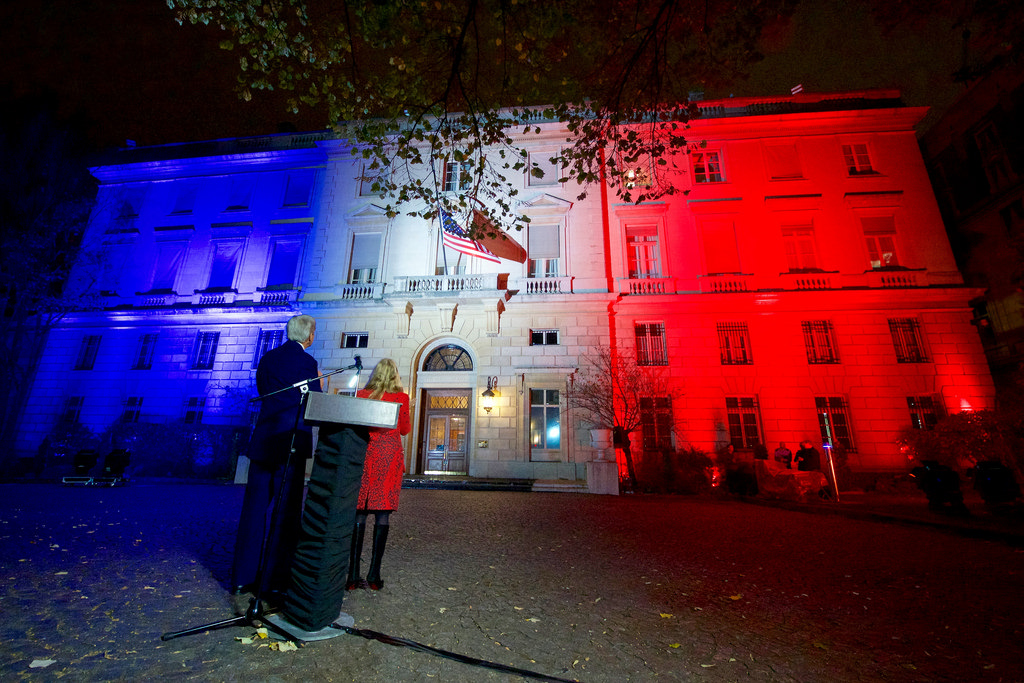 The US Embassy in Paris lit in the tricolor
The US Embassy in Paris lit in the tricolor
Developing an Effective Anti-ISIS Strategy
The recent terror attacks in Paris have created renewed demand to develop a real strategy for defeating ISIS.
From Beirut to the Metrojet bombing over the Sinai, these attacks show spillover from the Syrian Civil War that threatens the livelihood of people far beyond Syria’s borders.
To develop a comprehensive strategy aimed at defeating ISIS, America must:
Get Serious with its Allies
This is the real area in which the United States needs to lead. Before it can truly confront enemies like ISIS, the US needs to have all its allies on the same page. Washington needs to focus seriously on developing a comprehensive strategy that deconflicts the complicated web of goals existing between its Middle Eastern allies.
At the top of this list, the US needs to resolve issues with its NATO ally, Turkey. The situation involving the Kurdish population both within Turkey and Iraq has complicated the Syrian situation. A comprehensive policy towards the Kurdish population that addresses the issue of the PKK needs to be made a priority. Thus, the US needs to help develop a comprehensive agreement between Turkey, the Kurdistan Regional Government, and the Government of Iraq.
The US must also work harder with Saudi Arabia to truly, honestly address that country’s strategy in the wider Middle East. Saudi Arabia’s alliance with the US has had a great deal of benefits over the past several decades, especially in dealings with Russia and the Soviet Union. But the financing, ideology, and recruits coming out of Saudi Arabia that feeds terror groups like ISIS and Al Qaeda must come to an end.
Get Serious with its Adversaries
Every possible effort should be made to avoid armed conflict between the US and Russia. At the same time, the US needs to confront Russia about its activities in Syria and support of the Assad regime. The US should also recognize that Russia has certain interests in Syria, like access to a warm water port in the Mediterranean. Acknowledging and addressing these interests will aid in preparing for a political settlement in Syria. Russia will want assurances that its interests are protected in any post-war government, and given the severity of the crisis in the region, this is acceptable, provided Russia doesn’t use any potential basing rights to arrange a Sevastopol-style annexation of Syrian territory.
Iran is also a necessary element in this conversation. Groups like Hezbollah pose a major stability risk, not only for Lebanon, but for Syria as well. The US must do a careful assessment of Iranian goals, and decide with its allies which if any are acceptable to a political resolution of the Syrian conflict. If no Iranian goals are acceptable, a plan must be developed to end Iranian influence and protect against its resurgence.
Don’t Blame the Refugees
The refugees of the Syrian civil war are victims running for their lives. For years, they have witnessed first-hand the types of attacks we are seeing in Paris and Beirut. It is inhumane to deny refuge to people who need help and are being exploited by terrorists.
The nations of the world have a responsibility to care for these people. If the world shuts its door to the millions of people fleeing the wanton violence in Syria, it may open many more doors for ISIS and its kind to recruit directly from these populations. These refugees may be the key to rebuilding Syria along with a stable government and civil society after the conflict. Turning on them now may cause lasting resentment that is entirely avoidable.
Decide on an Appropriate Military Response
American wars of the 21st century have revolved around the key question of appropriate military response, especially to non-state actors like terrorist groups. The war in Afghanistan was initiated with small numbers of special forces liaising with local factions and backed up by air power. This soon became a drawn-out occupation featuring ever-rising numbers of US and allied troops. The Iraq war featured a large number of troops for the initial invasion, followed by an insufficient number for a true occupation. Neither strategy accomplished American strategic goals.
A military response should be tailored for US objectives in the country at hand, not for political expediency. Sometimes, this means no response—other times, it may take more than we want to commit. Planners must decide on an achievable political objective in Syria and tailor a military response that aids in achieving that objective. A full scale military invasion, an occupation, or a series of air strikes which does not account for post-war stabilization is a waste of blood and treasure. When Americans are sent into harm’s way, they should be given the tools and support to accomplish their mission with lasting results.
Get the Aftermath Right
The Syrian military should not be disbanded. This was a huge mistake after the invasion of Iraq—a mistake which contributed directly to the instability and insurgency the country still faces today. The Syrian military needs to have a stake in building a positive future for the country.
Plans and contingency plans must be made in advance for a variety of scenarios. Before pushing for regime change or a military response to completely destroy ISIS and remove Assad, plans must be in place to account for the possibilities that come after—an area in which the US has performed poorly in the 21st century.





